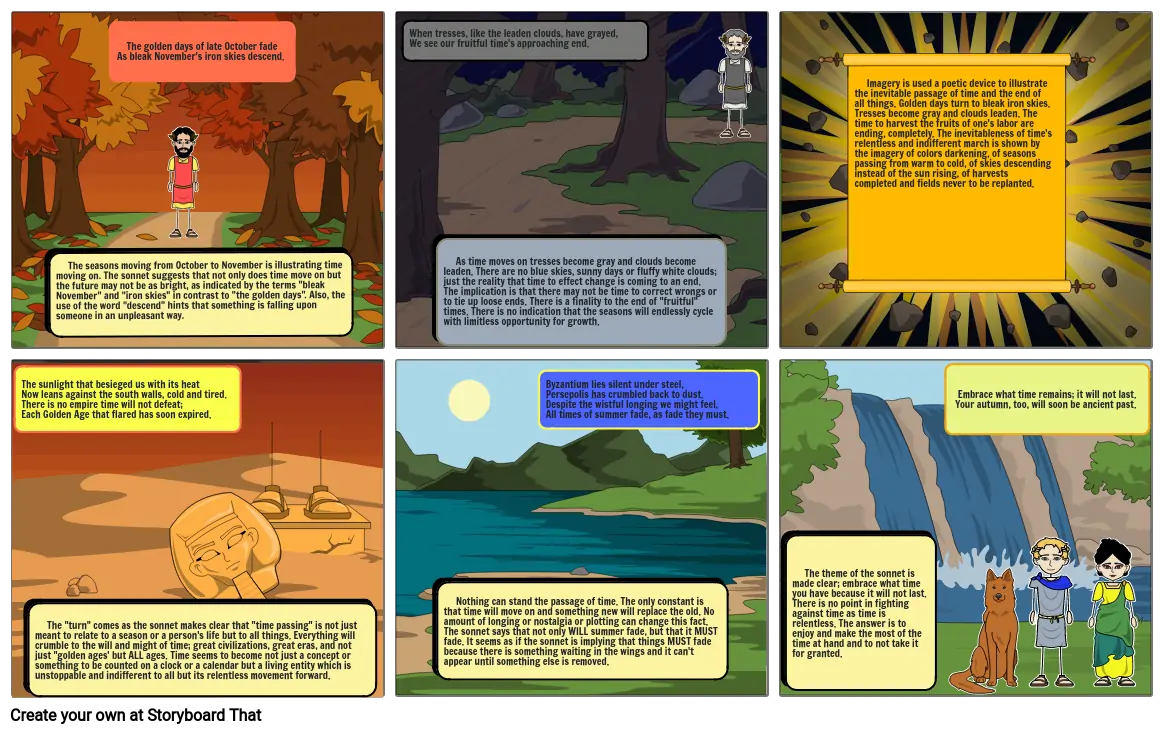Unit 4 Portfolio - Sonnets

Siužetinės Linijos Tekstas
- The seasons moving from October to November is illustrating time moving on. The sonnet suggests that not only does time move on but the future may not be as bright, as indicated by the terms "bleak November" and "iron skies" in contrast to "the golden days". Also, the use of the word "descend" hints that something is falling upon someone in an unpleasant way.
- The golden days of late October fadeAs bleak November's iron skies descend.
- When tresses, like the leaden clouds, have grayed, We see our fruitful time's approaching end.
- As time moves on tresses become gray and clouds become leaden. There are no blue skies, sunny days or fluffy white clouds; just the reality that time to effect change is coming to an end. The implication is that there may not be time to correct wrongs or to tie up loose ends. There is a finality to the end of "fruitful" times. There is no indication that the seasons will endlessly cycle with limitless opportunity for growth.
- Imagery is used a poetic device to illustrate the inevitable passage of time and the end of all things. Golden days turn to bleak iron skies. Tresses become gray and clouds leaden. The time to harvest the fruits of one's labor are ending, completely. The inevitableness of time's relentless and indifferent march is shown by the imagery of colors darkening, of seasons passing from warm to cold, of skies descending instead of the sun rising, of harvests completed and fields never to be replanted.
- The sunlight that besieged us with its heatNow leans against the south walls, cold and tired. There is no empire time will not defeat; Each Golden Age that flared has soon expired.
- The "turn" comes as the sonnet makes clear that "time passing" is not just meant to relate to a season or a person's life but to all things. Everything will crumble to the will and might of time; great civilizations, great eras, and not just "golden ages' but ALL ages. Time seems to become not just a concept or something to be counted on a clock or a calendar but a living entity which is unstoppable and indifferent to all but its relentless movement forward.
- Nothing can stand the passage of time. The only constant is that time will move on and something new will replace the old. No amount of longing or nostalgia or plotting can change this fact. The sonnet says that not only WILL summer fade, but that it MUST fade. It seems as if the sonnet is implying that things MUST fade because there is something waiting in the wings and it can't appear until something else is removed.
- Byzantium lies silent under steel, Persepolis has crumbled back to dust.Despite the wistful longing we might feel, All times of summer fade, as fade they must.
- The theme of the sonnet is made clear; embrace what time you have because it will not last. There is no point in fighting against time as time is relentless. The answer is to enjoy and make the most of the time at hand and to not take it for granted.
- Embrace what time remains; it will not last. Your autumn, too, will soon be ancient past.
Sukurta daugiau nei 30 milijonų siužetinių lentelių

